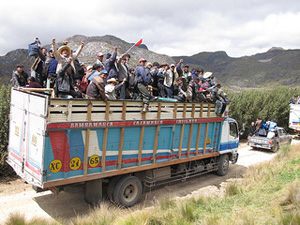A few weeks ago I blogged about Aymara communities ongoing struggle to stop a major silver mine near Lake Titicaca (map of site). These communities had been protesting the permitting of this major silver mine from the Canadian mining company Bear Creek for months. Fearing the continued pollution of their water sources and the threat of contamination of the sacred Andean lake, the protests were escalated in mid-May when 10,000’s of people converged in Puno. These protestors proceeded to blockade the major transportation and trade route to Bolivia to highlight communities’ demands and illustrate their determination to protect their right to self-determination and the environment.
The protests were lifted to enable the presidential runoff election to take place in the region in early June. This suspension was no doubt a smart strategic move, because Humala the eventual winner of the election was a popular choice in the community because of his voiced commitment to prioritize healthy communities over irresponsible mining.
Following the election, as promised, the protests resumed stronger than ever of June 8th. Now, with the support of communities, labor unions, and farmers from surrounding provinces the entire southern region was coming together to fight mining, oil, and mega dam projects on their lands. It was clear to the region, and to the Peruvian government, that this had turned from a protest against one mine to a demonstration of communities resistance to extractive industries destroying their lands, polluting their water, and stealing their futures.
“The government allowed this problem to grow from opposition to a mining project to opposition to mining and hydrocarbons in general,” says Rolando Luque, of the Peruvian government’s human rights ombudsman’s office”.
Two weeks after the protests in Puno resumed, these communities received good news. On June 24th stubborn Garcia administration issued a full revocation on the Bear Creek silver mine. In response, Walter Aduviri, leader of the Natural Resources Defense Front of the Southern Zone of Puno, announced a formal end to the civil strike this week. This came a week after a long-fought mega-dam project in the region had been canceled as well. These fights have been going on for years as Bear Creek had received its permit in 2007, while the Inambari Dams project has been a point of sustained protest in the region for years.
No FPIC means bad for business.
Both Bear Creek’s silver mine and the Inambari Dams investors were punched in the gut by these cancelations. Bear Creek’s stock plummeted 28% on the news of the cancellation. An understandable dip since the Santa Ana mine represented about 20% or Bear Creek’s reserves. At the same time, investors in the dam project lost out on $4.5 billion in contacts and construction.
What do the financial blows to these companies mean?
It means there is a MAJOR business case for respecting Free Prior and Informed Consent (FPIC). If mining companies, and extractive industry as a whole, do not begin to adopt FPIC standards for their projects, they will be essentially dooming their projects. Perhaps most importantly, in the boardrooms these corporations will also be dooming their stockholders. The events in Peru illustrate that there is a legitimate financial risk to companies stockholders if their companies continue refuse to do their due-diligence, and circumnavigate receiving the approval of local communities.
The deepest pockets cannot break these communities resolve. Yet it is clear that that resolve can surely break the deepest pockets.
As the political realities of the extractive industries begin to shift with the incoming Humala administration (Humala has committed to signing into law the UN Treaty on Indigenous Peoples, including FPIC) this July it will be interesting to see how companies operating in Peru will take a new approach to FPIC. Incredible commitment from strong communities has now made not adhering to FPIC a real financial liability.
*Note – Los Andes has compiled a good timeline of the events on their site: http://www.losandes.com.pe/Regional/20110625/51726.html (Espanol)

